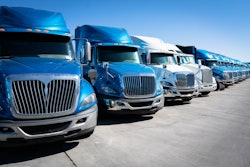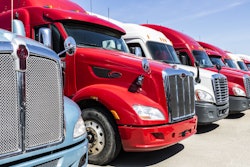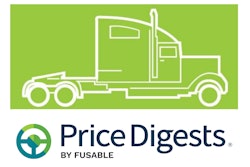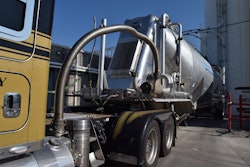It’s no secret that affording a new tractor has become more complicated for owner-operators and many smaller carriers over the past decade, as both equipment and insurance costs have risen dramatically.
Nonetheless, as acquisition patterns change, one of the most basic decisions you need to make remains the same: whether to buy or to lease. Each option has advantages and drawbacks.
PURCHASING. A truck purchase loan is usually spread over four to seven years for new power units. Monthly payments include principal and interest. With many finance contracts, you pay more interest per payment in the early years, and pay down more of the principal in the later years.
LEASING. Think of leasing like renting. You pay for the use of a truck that is not actually yours. When the lease is up -- usually in three to five years -- you return it to the lease company unless your contract includes an option to purchase the truck at a predetermined price. This residual value of the truck is often agreed upon in the original lease document. However, leasing models can vary greatly and differ from buying through a carrier’s lease-purchase program.
Traditionally, few owner-operators take this route toward acquiring equipment, with only 2% of Overdrive readers signaling they leased their latest truck independent of a carrier's program in a late 2021 survey. Yet maintenance contracts included as part of the deal, where the leasing company assumes responsibility for most maintenance, could be good insurance against emissions-system issues seen in some later-model diesels.

[Related: Carriers' lease-purchase programs 'meaningful' for at least half of lessee operators]
Define your business
If you are looking to buy or lease a first truck and find a carrier to lease to, any reputable carrier representative will be eager to help you understand their operation before you commit to a truck acquisition. As you talk with potential carriers or other customers, further outline your business model. This is a great opportunity to spec the right truck for the work you are planning.
As you begin talks with sales representatives about buying or leasing, make sure you can answer a few key questions about the operation you're planning to enter:
- Does the carrier have tractor restrictions that will affect your purchase? Some companies won’t use trucks that are beyond a certain age, or may require additional items such as a headache rack.
- What fees apply to you as an owner-operator? Are you required to buy base plates at startup? Does your carrier require additional purchases, such as an onboard communications system? When are these required?
- How much will you need as a down payment for insurance?
- What are you being paid per mile or as percentage of revenue, and what are the average miles per month you can expect? Dispatchers and other owner-operators may be more candid than other company representatives. See more on choosing a carrier here.
Financing your equipment
Financing a truck can be frustrating, confusing and time-consuming, especially for first-time buyers. It also can be costly if you are not prepared. The more deliberate you are about this process, the better your position. Give yourself plenty of time to shop for a truck and for favorable financing. Visit dealers and ask questions. Know what risk you present for a potential lender. For new owner-operators, that risk generally is considered great. Anything you can do to minimize it is worth the effort.
The good news is that truck loans, like business loans from a bank, usually have lower rates than credit cards. Loans for trucks and other secured loans, such as cars or houses, are lowest because assets are backing them up. A bank’s business loan often is about 1% a month or 12% annually, though good-credit borrowers in recent years, particularly before the 2022-’23 run-up in interest rates, have seen rates as low at 5% on truck loans.
Get a copy of your credit report before you attempt to secure equipment financing. Your credit history could contain wrong or harmful information that you’ll want to explain to a potential lender. Always be upfront about your problems. Showing you have overcome hard times demonstrates determination and strong character.
[Related: Do owner-operators need to worry about credit scores?]
When you apply for a loan, be prepared to provide as much information as you can. Show the lender you are a business owner first and a truck operator second. You’ll need a budget, a cash-flow statement and a business plan.
A detailed budget will assure the lender you can meet the financial obligations of owning a truck. A cash-flow statement shows your projected revenue will be sufficient to meet current obligations. A business plan outlines the details of your operation, including the types of freight you’ll haul, the traffic lanes you’ll run and the rate you’ll be paid. It also lists contact information of the company to which you plan to lease, as well as a contact name to verify that lease.
If you plan to run independently with motor carrier authority, you’ll need to list contact information for your customers. Bring your lender a list of credit references, even if you don’t have a perfect credit history. Include present and past creditors.
Financing sources
There are multiple options for borrowing money. Check around for the lender that best suits your needs. According to a late 2021 Overdrive survey, 41% of readers who had recently purchased a new truck financed it through a bank loan, while 37% said they used a captive or specialty finance company, one associated with a truck dealer or who specializes in commercial equipment loans. For used truck buyers, 35% said they used a bank loan, compared to 22% who used captive/specialty companies. Nearly 40% of used truck buyers paid cash.
BANKS. Banks are reluctant to lend money for an over-the-road truck. In their opinion, “rolling collateral” is not a good risk. If you’ve been doing business at the same bank for a long time, however, and have an established relationship with a loan officer, it could be worth taking this route if your credit is good.
CAPTIVE LENDING INSTITUTIONS. These finance companies are owned by equipment manufacturers. They often are more willing than banks to lend money to new owner-operators because they are in the business of selling trucks.
USED TRUCK DEALERS. Your dealer may refer you to lenders other than captive finance arms.
COMMERCIAL LENDING INSTITUTIONS. These finance companies are not necessarily affiliated with truck manufacturers, but certain ones cater to the trucking industry.
Getting the money
The cost of borrowing has been on the rise, for some even doubling in recent years with hikes in the federal funds rate aimed at taming runaway inflation throughout the economy. Lending standards have tightened a bit in recent times, too, particularly for those with lower credit scores. With good credit, though, you should be able to get a loan with good terms. “A” credit score borrowers might expect loans at rates in the high 7% to mid 8% range, 650-700 “B” credit borrowers’ rates in the high 9% range. C and D credit borrowers below those credit score ranges, though, are like as not to see high teens and even above 20% interest, in some instances.
More than half of owner-operators report a credit score above the nationwide average around 700. (Overdrive polling in 2023 indicated a majority of owner-operators [58%] have credit scores above 750, with the next-highest share [17%] falling between 701 and 750.)
So-called “challenged-credit” borrowers (with a score of 650 or below) are more likely to need a 10%-20% down payment and could easily pay rates above 10%, as noted.
Whatever type of financing you choose, keep in mind that truck loan interest rates can vary by two or three percentage points from lender to lender, or even more -- a potential difference of thousands of dollars in interest costs over the life of a loan.
No matter where you obtain financing, the following can affect your interest rate:
Credit history. People who have good credit get the lowest interest rates.
Professional record. Job-hopping indicates a lack of responsibility and rings the alarm for a lender. Factors such as yearly earnings, business longevity and how long you’ve hada commercial driver’s license also give some indication of your risk.
Personal factors. People who live at the same address for a long time usually have a better credit rating. A recent home foreclosure or truck repossession, as well as items that show up on public records, have a bearing on your financing.
Read next: Moving truck financing terms in your favor









